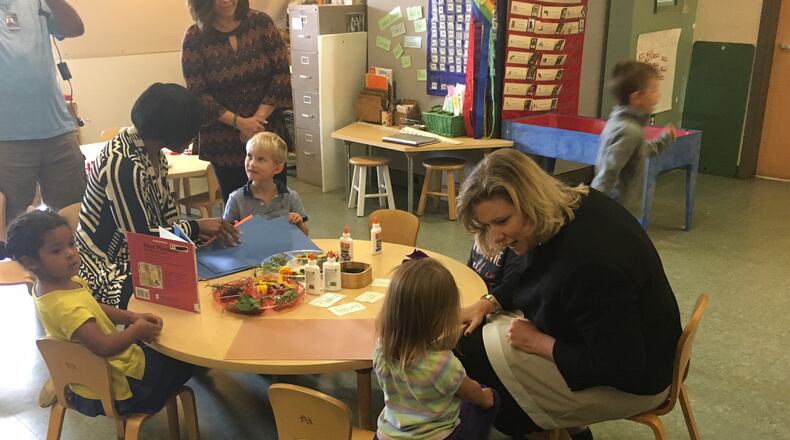Preschool Promise Executive Director Robyn Lightcap and University of Dayton economist Richard Stock presented 2017-18 enrollment data to the Preschool Promise board at its meeting Wednesday.
Last year, during a “demonstration” project limited to northwest Dayton and Kettering, 811 4-year-olds attended Preschool Promise-affiliated providers. This year, with the program still in Kettering and expanded to the entire city of Dayton, that number is 1,726, according to Lightcap and Stock.
But those numbers include 4-year-olds who may live in other communities but attend Dayton or Kettering centers, perhaps near a parent’s workplace.
Just over half of 4-year-olds who live within the geography of Dayton Public Schools (1,064 out of 2,078) are attending Preschool Promise sites, according to Lightcap and Stock. Just less than half of that number are in DPS preschools. But Preschool Promise officials estimated there are still about 32 percent (roughly 660 4-year olds) who don’t attend any preschool.
Lightcap said it’s hard to compare this year’s data to last year’s, before the program went citywide, but she wouldn’t say there had been significant progress in attracting families who had not used preschool at all.
RELATED: Whaley calls Dayton preschool effort a success
“I think we are making progress with those programs that have not been rated as high-quality. We’re helping them improve with the big quality investment (including staff training),” Lightcap said. “But I think we still have work to do to find our families that aren’t sending their kids at all.”
Last year, Dayton voters approved an income tax measure that provides roughly $4.3 million per year to Preschool Promise, with the group using that money for family tuition assistance at private preschools as well as staff training for both public and private preschool providers. Montgomery County, Kettering and some private funders also contribute.
City, school and Preschool Promise officials have all pointed to high-quality preschool as a way to prevent low-income students from starting school academically behind. DPS has been a leader, offering free, five-star preschool in recent years, at its own cost.
RELATED: Preschool board tries personal approach
The Preschool Promise Board on Wednesday approved a $650,000 contract with Dayton Public Schools, to help DPS expand to five-day-per-week, full-day preschool. Some DPS officials questioned whether the dollar amount should have been higher.
Preschool Board members Jan McGee Rafal and Anissa Lumpkin on Wednesday said they were excited to work with DPS as a partner. Lumpkin said she hoped to see enrollment rise and for the focus to stay on serving children.
In other items Wednesday, the board approved a “parent ambassador” program that would pay $500 per year to parents who promote Preschool Promise in their existing networks, via social media and at events.
RELATED: $34 million in preschool funding approved
The board also approved a contract with Sparkbox to begin the work of moving the Preschool Promise application online. Lightcap reported that Preschool Promise is under budget this year, and that school providers’ state ratings continue to change, with seven improving their star ratings, and four seeing their rating drop.
About the Author

